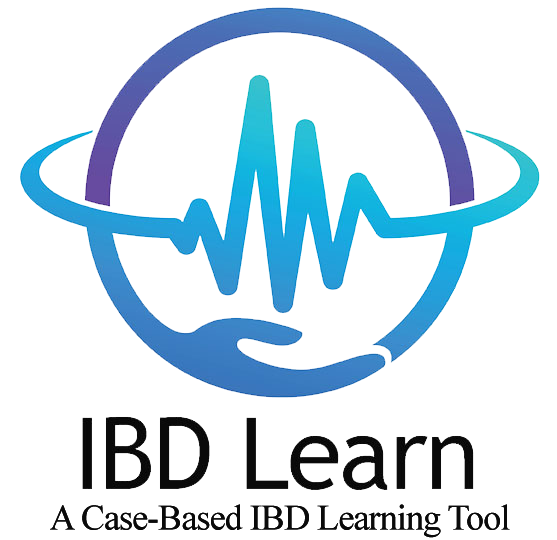Learning Objectives:
- Stratify the patient presenting with acute ulcerative colitis according to colectomy risk.
- Perform appropriate diagnostic work-up for the patient presenting to the hospital with acute severe ulcerative colitis.
- Select appropriate therapy for the patient with acute severe ulcerative colitis responsive to glucocorticoids.
IBD EPAs Covered:
- EPA 1: Classify Inflammatory Bowel Disease Phenotype, Disease Activity, and Extraintestinal Manifestations
- EPA 3: Prescribe and Manage Evidenced-based Inflammatory Bowel Disease Therapies Utilizing Clinical Pharmacologic Principles in Clinical Practice
- EPA 5: Manage Hospitalized Patients With Inflammatory Bowel Disease
- EPA 7: Manage Inflammatory Bowel Disease in Special Populations
Discussion
A key decision point in the management of ulcerative colitis is appropriate stratification according to colectomy risk. High-risk factors include extensive colitis, deep ulcers, age < 40, high CRP and ESR, steroid-requiring disease, history of hospitalization, C. difficile infection, and CMV infection. In addition, all patients with acute severe ulcerative colitis requiring hospitalization should be considered at high risk for colectomy, as in this case.
Appropriate diagnostic work-up for a patient with acute severe UC includes basic labs including a marker of inflammation, stool infectious studies (C. difficile and stool bacterial studies at minimum, and additional studies for patients with risk factors for parasitic infections), blood cultures for patients with fever or leukocytosis (in the absence of glucocorticoids), imaging (plain film at minimum, cross sectional imaging if suspected complication), and a limited endoscopic evaluation. Flexible sigmoidoscopy is often sufficient to determine disease severity and obtain biopsies to exclude infection; full colonoscopy is often avoided in the setting of severe colitis because of increased perforation risk.
IV steroids are a mainstay of management of hospitalized patients with acute severe UC. A short trial is recommended; continued use of steroids beyond 7 days is not effective for non-responders. If the patient is refractory to IV steroids, current guidelines suggest either infliximab or cyclosporine for induction of remission. If, as in the case, the patient does respond to steroids, a broader array of biologics may be considered. Regardless, steroid sparing therapy should be started as soon as pre-tests allow.
The only head-to-head randomized controlled trial of biologic therapies for UC compared vedolizumab with adalimumab, with a primary outcome of week 52 clinical remission favoring vedolizumab. While this trial clearly positions vedolizumab ahead of adalimumab as first-line biologic therapy for moderate to severe UC, there has been no direct comparison between vedolizumab and infliximab, which is generally regarded as the most effective anti-TNF agent. Indeed, a 2020 updated network meta-analysis of current therapies for induction in biologic-naïve patients with moderate to severe UC favored infliximab as the most effective current agent, with vedolizumab falling behind – though only the comparisons favoring infliximab over adalimumab or golimumab reached statistical significance. However, this patient required hospitalization and IV steroids, therefore infliximab would be the first choice unless there are relative contraindications to consider such as age and co-morbidities, in which case an argument could be made for choosing vedolizumab or ustekinumab given their more favorable side effect profile.
References
Click here to move on to the post test
Click here to the start of the case
